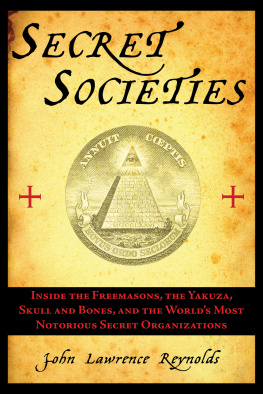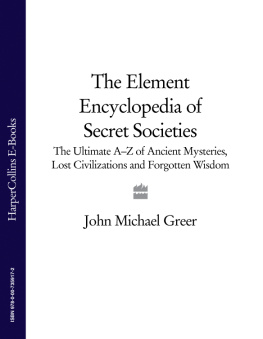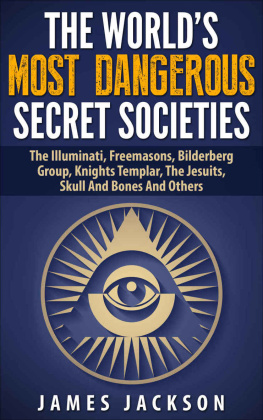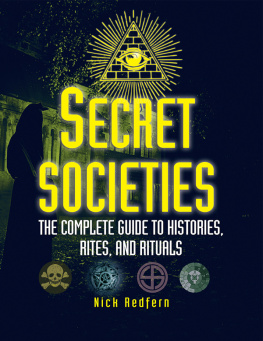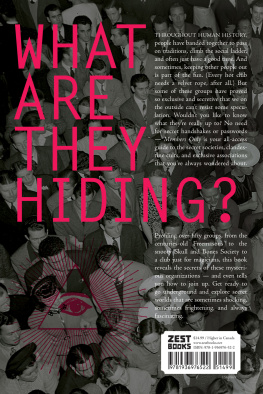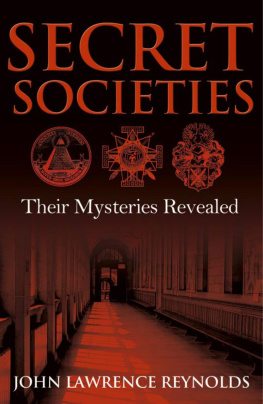SECRET
SOCIETIES
SECRET
SOCIETIES
INSIDE THE FREEMASONS, THE YAKUZA,
SKULL AND BONES, AND THE WORLD'S MOST
NOTORIOUS SECRET ORGANIZATIONS
John Lawrence Reynolds

Copyright 2006, 2011 by John Lawrence Reynolds
All Rights Reserved. No part of this book may be reproduced in any manner without the express written consent of the publisher, except in the case of brief excerpts in critical reviews or articles. All inquiries should be addressed to Arcade Publishing, 307 West 36th Street, 11th Floor, New York, NY 10018.
Arcade Publishing books may be purchased in bulk at special discounts for sales promotion, corporate gifts, fund-raising, or educational purposes. Special editions can also be created to specifications. For details, contact the Special Sales Department, Arcade Publishing, 307 West 36th Street, 11th Floor, New York, NY 10018 or info@skyhorsepublishing.com.
Arcade Publishing is a registered trademark of Skyhorse Publishing, Inc., a Delaware corporation.
Visit our website at www.arcadepub.com.
First published in Canada under the title Shadow People by Key Porter Books Limited.
10 9 8 7 6 5 4 3 2 1
Library of Congress Cataloging-in-Publication Data is available on file.
ISBN: 978-1-61145-042-2
Printed in the United States of America
For Anna P.,
of course.
Cruelty has a human heart,
And jealousy a human face;
Terror the human form divine
And secrecy the human dress.
WILLIAM BLAKE
The more things you know,
or pretend to know, the more powerful you are.
It doesn't matter if the things are true.
What counts, remember, is to possess a secret.
UMBERTO ECO
CONTENTS
Fools, Fears and Fanatics
Nothing Is True, Everything Is Permitted
The Secret Seat of Power
Keepers of the Holy Grail
Knowledge and the Eternal Soul
Origins of the Apocalypse
The Pursuit of Esoteric Wisdom
Cultural Criminals
Wise Guys and Businessmen
Traditions and Amputations
TEN WICCA
The Great Goddess and the Horned God
America's Secret Establishment
An Endless Fascination
When Does Paranoia Make Sense?
Of Demons and Baloney

INTRODUCTION
FOOLS, FEARS AND FANATICS
THEY WERE AMONG THE MOST FRIGHTENING OF EARLY SECRET societies, a furtive group both feared and hated by citizens of the Roman Empire. Many suggested killing every man, woman and child who were members. Others proposed caution, having heard tales of bloody vengeance taken against enemies of the group. Some grew worried that their own neighbors might be society members, infecting their children with dangerous ideas and engaging them in revolting practices. A few were fascinated by the outrageous antics attributed to this secret organization; their curiosity piqued, their imaginations running rampant, they asked themselves: could these people really be so depraved?
Tales exchanged among the Romans were almost beyond belief. The members of this secret group, it was said, were cannibalistic, eating human flesh and drinking human blood during secret rituals, and their gory feasts often included newborn babies. They promoted sexual orgies among brothers and sisters, and engaged in bizarre ceremonies, met in clandestine locations, avoided contact with respectable society, and identified themselves by flashing the image of an instrument of torture when they met.
An infant covered with their meal that it may deceive the unwary, one Roman wrote, is placed before him who is to be stained with their rites. This infant is slain by the young pupil, who has been urged on as if to harmless blows on the surface of the meal, with dark and secret wounds. ThirstilyO horror!they lick up its blood; eagerly they divide its limbs. By this victim they are pledged together; with this consciousness they are covenanted to mutual silence. Such sacred rites as these are more foul than any sacrileges
Throughout the Mediterranean region during the first century of the first millennium, especially among Romans, who valued nobility above all qualities, these stories were equally repulsive and fascinating. Roman politicians began demanding elimination of the sect, without question or exception. Most citizens agreed, and crowds began to gather in the marketplace where they exchanged tales, confirmed evidence, and embellished the more unpleasant aspects of the secret society's behavior. Over time, a consensus was reached: something must be done to break the cult's bonds and rein in these scoundrels, these perverts, these insurgents, these Christians.
From our perspective two thousand years later, the tales of disgusting Christian practices sound like propaganda created by members of the Roman senate as a strategy to eliminate the sect. Perhaps by spreading vile stories among the populace, we assume, citizens would be dissuaded from joining the ranks of Christians, and Rome's harsh treatment of the new religion's followers would be supported.
In reality, the Roman senate had little to do with the outrageous tales. While the general populace may have been scandalized by reports of cannibalism and incest, public opinion mattered little to politicians, who were concerned with more practical matters, including the refusal of Christians to worship the emperor. Tolerant of religious disparity generally, Rome's major objection addressed this single unacceptable behavior, considered an act of disloyalty to the Empire. When Christians began converting others to their point of view, their actions represented an insurgency that could not be ignored. At that point, Roman leaders encouraged stories of their scandalous activities, employing them as a weapon to suppress the movement.
But Rome's senate and other leaders did not originate the stories of bizarre behavior by Christians. These yarns, spun in the imaginations of ordinary citizens, were based on information provided by Christians themselvesinformation subject to exaggeration and malignment that grew directly out of the twin mills of ignorance and suspicion. Consider the clues that inspired the tales:
SECRECY. Christians kept to themselves, did not admit strangers to their ceremonies without the approval of a known member, and demanded that new members undergo a test of faith before being admitted. But there were valid reasons for all these actions. Following Christ's crucifixion, declaring that you were a Christian was akin to signing your death warrant. When Christians began concealing their activities in response, paranoia over their goals and practices grew deeper and more widespread, stimulating a more desperate need for members to mask their identity. And so spun the cycle of oppression, leading to deeper secrecy and generating greater paranoia, inviting new oppression.
CANNIBALISM. Didn't Christians conduct ceremonies in which they consumed the flesh of a man, and drank his blood? Of course they did. To Christians, the Communion sacrament represented an allegory of oneness with the spirit. To unbelievers, it sounded suspiciously like repulsive reality.
EATING BABIES. Lacking effective methods of contraception and abortion, poor Roman citizens set unwanted infants outside to die of starvation and exposure. As abhorrent as this may be to modern sensibilities, it was acceptable practice in a culture where unwanted mouths to feed presented a major burden on the family. When Christians began rescuing these infants from certain death, baptizing them into their faith, Romans grew confused. Why would someone choose to raise another's child? The idea defied logic. Or perhaps they were not being raised at all. Perhaps, given their practice of consuming flesh and blood, Christians gathered abandoned babies as a source of raw material for their disgusting ceremonies. The fact that these children were being cared for and raised as Christians was not considered plausible. Nor, of course, was it nearly as intriguing.
Next page
